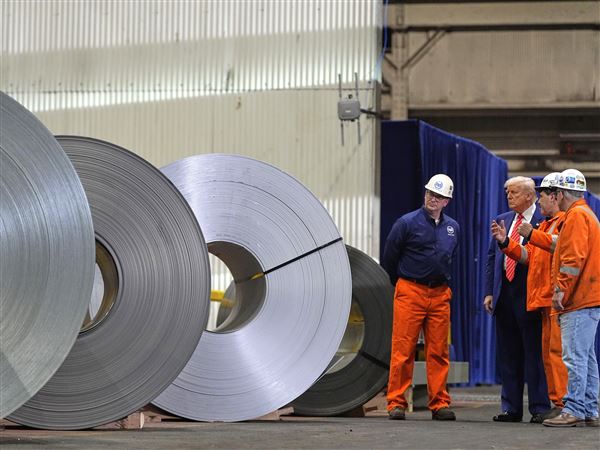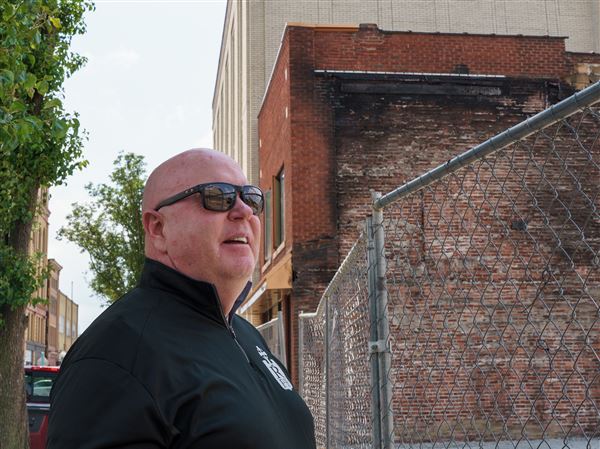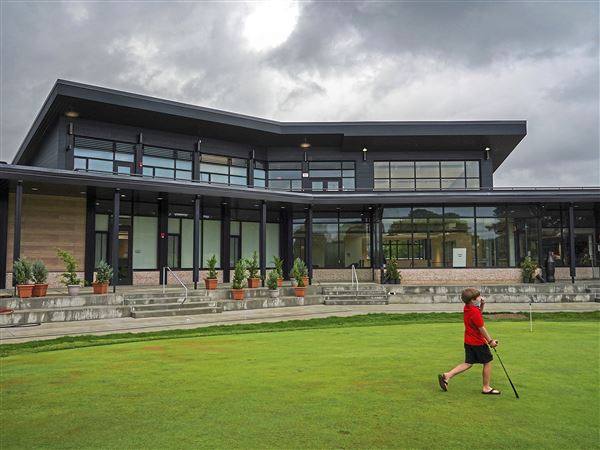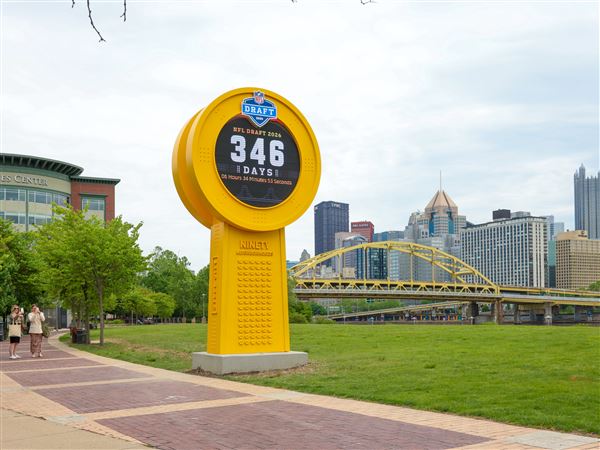BROCKWORTH, England -- For a day each May, Cooper's Hill -- a mogul-pocked, sheep-dip-slicked, treacherous cliffside in Gloucestershire county in southwest England -- becomes the place for the famously stiffed-lipped British to have a laugh, or at least a guffaw. At the stroke of noon on May 26, through a howling gale, as cold rain lashed thousands of spectators, a calm BBC voice echoed over the loudspeaker.
- How to get there: The Cotswolds are easily reached from London's Heathrow and Gatwick airports (via American, Delta, Continental, Northwest, United and US Airways) or from Bristol International Airport (Continental). Round-trip air fares with three-week advance purchase from Pittsburgh start at $1,289. Although none of the villages mentioned in this story is served directly by train service, trains from London's Paddington Station stop in Cheltenham, Stratford, Chippenham, Gloucester, Kemble, Moreton-in-Marsh and Kingham.
- Information: More information: Gloucestershire Tourism: www.cotswolds.com; VisitBritain: In the United States, call toll-free: 1-800-462-2748; www.visitbritain.us; www.visitscotland.com; www.visitliverpool.com.
"One to be ready, two to be steady ... GO!"
A small disk, tied with red and blue ribbons, suddenly bounced over the ridge, chased by two dozen soaking competitors. As they careened down a 200-meter slope of black-diamond difficulty, the leader struck the swamp-like finish line chin first, as his prize, a wheel of cheese, rolled out of reach. As a medical crew hoisted the winner's motionless body onto a stretcher, the muddy audience cheered.
Take that, Beijing.
At this, perhaps the 1,500th cheese-rolling competition to take place on this Gloucestershire mount, the British demonstrated that when it comes to ancient organized athletic competitions, no one does it sillier.
Cheese rolling, shin kicking, woolsack races and hammer throws (with real sledgehammers) have pitted Britain's looniest sportsmen against each other here each May since medieval times -- or, in the case of the cheese rolling, perhaps since the age of the Druids.
Said local cheesemaker Charles Martell: "It's young men showing off for their girls -- since ancient times! They say that it used to be heads rolling."
Martell may be prone to exaggeration. He is, after all, the creator of the Stinking Bishop, a fragrant local cheese made famous by the Wallace & Gromit movies. But he approved of the first prize in the competition: not a gold medal, but the sodden, beribboned wheel of double Gloucester, awarded this year to 20-year-old Christopher Anderson. (Second prize: 10 pounds, or about $20.)
The final week of May is the best time for spectators to take in a crop of Monty Pythonesque proceedings in the Cotswolds, the British equivalent of the Hamptons. The region's beautifully preserved villages, an hour west of London, use the competitions as an excuse for outdoor fetes, cream teas and zany costume parades. Who could resist? No one with a well-developed sense of the absurd.
Coinciding with the extended twilights of late spring, the long bank holiday weekend (our Memorial Day) also holds the promise of fair skies -- a promise frequently dashed, as it was for my visit this year, by the island's reliably wet weather.
Along with the prospect of village socializing, the certainty of a few injuries heightens local anticipation. "We'll be close enough to hear the bones cracking," promises my smiling cheese rolling escort, Chris Dees. Our place at the soggy finish line was ideal for viewing the carnage, as the first crew of runners, clad in football jerseys, raincoats, and, inexplicably, one pink pig costume -- hurtled toward us.
Paramedics pushed forward, ready to scoop up the wounded. I sympathized with Mrs. Anderson, the sobbing mother who followed her first-place son Christopher to the ambulance. I found myself cheering with her an hour later in the village pub, where her son stood fully recovered, toasting his friends with a pint of bitter. I asked the Gloucester resident how he trained for the event. "I run down a few times and have a bottle of Smirnoff Ice," deadpanned Anderson, who has sustained a concussion and a broken ankle during four winning descents.
On nearby Dover's Hill, a broad natural amphitheater near Chipping Camden, the orthopedic damage is confined to shins. Shin-kicking is a highlight of the Cotswolds Olympicks, founded by Robert Dover in 1612 and memorialized by writer Ben Jonson a decade later.
When King James I allowed Sunday games, local villages devised such "harmless" competitions as obstacle races, full-body sack races and tug-of-wars. Today, the two-day event includes the Scuttlebrook Wake, a parade that ends with maypoles and morris dancing in Chipping Camden.
Today's teams are often formed among local chapters of the Young Farmers, Britain's 4-H, volunteer fire companies or pub patrons. The obstacle courses are lengths of plastic draped over bales of hay. Before contestants start, the course is coated with a devilishly thin layer of water and Fairy Liquid (dish detergent), guaranteeing pratfalls all along the way. The hammer throw event employs a working sledgehammer, but the day's least harmless event is the shin-kicking final.
"Competitors are allowed to protect their shins with straw or padding," explained Francis Burns, secretary of the Games Society, over lunch at the Gumstool Inn.
Burns, the enthusiastic cheerful historian of the Dover Olympicks, demonstrated how pairs of participants grasp each other's shoulders, aiming sharp kicks to knock the opponent off balance. As in the 17th century, an official Stickler -- in this case, Burns -- referees the match and enforces the rules (no blows above the knees, best of three falls). The reigning shin-kicker is genial publican Joe McDonough, who proudly dons the white shepherd's smock required of all contestants.
The traditional garb is a reminder of what made the Cotswolds' medieval fortune. "Half the wealth of Britain was on the back of a sheep," local Anne Barlett told me proudly. The "wool towns" prospered by shearing, spinning and weaving. Wealthy merchants endowed the stone churches that nestle in deep green valleys here and gathered in grand guildhalls, like the one that stands in the center of Tetbury.
Bordering Prince Charles' Highgate estate, Tetbury enacts the past with its annual woolsack races, where men compete with 48-pound burlap sacks of wool on their backs. The race course is the village's steep and cobbled main street, anchored by the Royal Oak and Old Fleece pubs at either end.
The best contestants turn out to be local veterinarians. "They're used to hauling large animals," explained race committee member Ken White, with a straight face. Pointing down the winding road, he clarified the rules: "You run like hell down the hill, throw down the bag, and the next teammate runs up."
I briefly shouldered the load for women competitors -- a mere 30 pounds -- and immediately disqualified myself for either leg. Not to be outdone, kids under 10 zoom up and down with lighter pillowcases and total aplomb. "They go like ferrets!" said White, with admiration.
Make that small, wet ferrets. Like the cheese rollers, the woolsack competitors were drenched to the skin in this year's storms. They probably will be next year, as well. No matter. For these quirky competitors, like all top-notch athletes, the thrill of victory is reward enough -- if served with proper tea, a biscuit, and a bit of soggy cheese.
First Published: August 3, 2008, 8:00 a.m.















